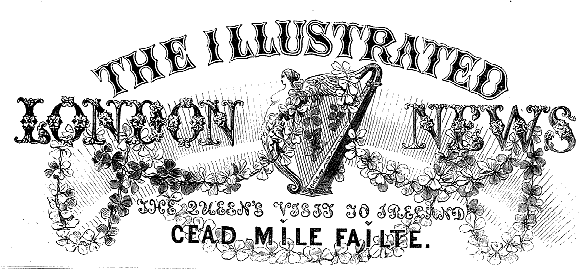
|
THE ILLUSTRATED LONDON NEWS. |
[Aug. 12, 1843. |
![]()
IRELAND AND THE IRISH.
Our attention having been repeatedly drawn of late, by several correspondents, to the social condition of the sister country, with a view to the pictorial illustration of its multicoloured phases, we have procured the annexed series of sketches, which, we are persuaded, will be equally interesting to our English and Irish readers. Before proceeding to their details, we should observe that the several sketches, graphic and descriptive, are the result of recent tours made by the artists and authors.
First, stands impersonated before you in the rags, wretchedness, and recklessness of
IRISH POVERTY!
Do not say "hence," but look her straight in the face, and hear her tale, whilst she tells it in the meek sadness of a breaking heart. The time is come for you, Christian England, to do so, for she is beginning to appeal not so much to your pity as to your peace of mind.
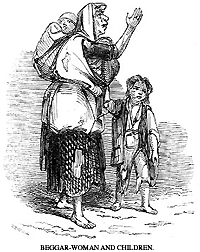 The Irish
beggar-woman! Who that has ever seen or heard ever can forget her? Wan, wasted,
wobegone, squalid beyond description, she says not unto Jacob, "Give me
children, or I die!" And how many of the rich Rachels of womankind would
not give half of what they are worth in this world for even one of those dear
suffering infants-- one on poor Molly's back, and the other at her breast-- her
first and tenderest care, who are, as she tells you, "crying with the
hunger, and coaxing their guardian angel to soften your heart." Look at
Molly's firstborn. He seems half sad, and yet "he's a droll boy, every inch
of him." He, poor fellow, is addicted to a remarkably spare style of
regimen. Give him a potato, and if he is not happy, he is at least content. He
once had the audacity to suggest to his mother that a grain of salt would be, in
his opinion, a great improvement to the national esculent, "if he could
only get it." "Cock you up with dainties, you young vagabond; is it
after earning the gallows for yourself you'd be?-- the next you'll be after
wanting is a glass of whisky to wash it down!" Padyheen (little Paddy)
bears this and every other species of rap and repartee with philosophy. Throw a
copper coin down there on the road side, and he'll go through an Irish jig or a
hornpipe that would make Perot bite his lip; or twitch the delicate nerves of
Taglioni, and beat the Polonaise, the Pas de Basque, the Pirouette, or the
Bolero, for it is a wild essence of them all confounded together. Padyheen's is
literally the power, if it be not the poetry, of motion. He does not require
your music or your foreign airs. He is his own piper-- a sifleur of surpassing
sweetness, with a wild curl in his little whistle as he gives you one of his
wildest airs that you may in vain try to equal, although you have in your day
and in any part of England whistled at the cart's tail or in the shafts of a
plough. Dancing through his destiny, therefore, not wrestling with his lot, till
the "prima lanugo," first down of manhood appears upon his
chin; take care he don't then dance to another tune and make somebody pay the
piper. Rock or Spartacus, a midnight legislator, or a rebellious slave in the
open day-- look to him in time, especially you Irish landlords, whose very
existence now depends on his moral and social amelioration. His condition, as
the Premier of England has said, is "a question of morals, not of
laws;" and a late Under-Secretary for Ireland said not long ago that
"property has its duties as well as its rights." Do you deny the truth
of the appeal, and dare you still call on English power and the majesty of the
laws to keep up your system? Where is the husband of that wretched,
houseless wanderer from door to door-- the father of those "young
barbarians"-- where is he? He is in England, reaping and mowing to earn you
seven times the value of his little patch of ground that he may keep the hovel
of a homestead which is upon it over his family during the hard winter. This
must be given up, if whilst away his wife and children cannot get enough to
support life, and should present themselves at the gates of the union workhouse.
Not a penny of outdoor relief! And, if they give up their little all, what a
fate awaits them within those places of sighs and tears! Two scanty meals of
potatoes; milk at one of them, and not a spoonful of broth (meat would set the
wretches mad, according to the Poor-law Commissioners) from the 1st of January
to the 31st of December. Twopence in the shilling to the poor, and tenpence to
the officers-- there's the Irish Poor-law for you in one short sentence; and
that's a grievance that needs no ghost from the grave to discover, no demagogue
to dwell upon its enormity. No wonder, then, that, whilst the poor husband is
away in England, the wife puts the padlock on the cabin-door, and presents, with
her poor little ones, the melancholy picture before you:--
The Irish
beggar-woman! Who that has ever seen or heard ever can forget her? Wan, wasted,
wobegone, squalid beyond description, she says not unto Jacob, "Give me
children, or I die!" And how many of the rich Rachels of womankind would
not give half of what they are worth in this world for even one of those dear
suffering infants-- one on poor Molly's back, and the other at her breast-- her
first and tenderest care, who are, as she tells you, "crying with the
hunger, and coaxing their guardian angel to soften your heart." Look at
Molly's firstborn. He seems half sad, and yet "he's a droll boy, every inch
of him." He, poor fellow, is addicted to a remarkably spare style of
regimen. Give him a potato, and if he is not happy, he is at least content. He
once had the audacity to suggest to his mother that a grain of salt would be, in
his opinion, a great improvement to the national esculent, "if he could
only get it." "Cock you up with dainties, you young vagabond; is it
after earning the gallows for yourself you'd be?-- the next you'll be after
wanting is a glass of whisky to wash it down!" Padyheen (little Paddy)
bears this and every other species of rap and repartee with philosophy. Throw a
copper coin down there on the road side, and he'll go through an Irish jig or a
hornpipe that would make Perot bite his lip; or twitch the delicate nerves of
Taglioni, and beat the Polonaise, the Pas de Basque, the Pirouette, or the
Bolero, for it is a wild essence of them all confounded together. Padyheen's is
literally the power, if it be not the poetry, of motion. He does not require
your music or your foreign airs. He is his own piper-- a sifleur of surpassing
sweetness, with a wild curl in his little whistle as he gives you one of his
wildest airs that you may in vain try to equal, although you have in your day
and in any part of England whistled at the cart's tail or in the shafts of a
plough. Dancing through his destiny, therefore, not wrestling with his lot, till
the "prima lanugo," first down of manhood appears upon his
chin; take care he don't then dance to another tune and make somebody pay the
piper. Rock or Spartacus, a midnight legislator, or a rebellious slave in the
open day-- look to him in time, especially you Irish landlords, whose very
existence now depends on his moral and social amelioration. His condition, as
the Premier of England has said, is "a question of morals, not of
laws;" and a late Under-Secretary for Ireland said not long ago that
"property has its duties as well as its rights." Do you deny the truth
of the appeal, and dare you still call on English power and the majesty of the
laws to keep up your system? Where is the husband of that wretched,
houseless wanderer from door to door-- the father of those "young
barbarians"-- where is he? He is in England, reaping and mowing to earn you
seven times the value of his little patch of ground that he may keep the hovel
of a homestead which is upon it over his family during the hard winter. This
must be given up, if whilst away his wife and children cannot get enough to
support life, and should present themselves at the gates of the union workhouse.
Not a penny of outdoor relief! And, if they give up their little all, what a
fate awaits them within those places of sighs and tears! Two scanty meals of
potatoes; milk at one of them, and not a spoonful of broth (meat would set the
wretches mad, according to the Poor-law Commissioners) from the 1st of January
to the 31st of December. Twopence in the shilling to the poor, and tenpence to
the officers-- there's the Irish Poor-law for you in one short sentence; and
that's a grievance that needs no ghost from the grave to discover, no demagogue
to dwell upon its enormity. No wonder, then, that, whilst the poor husband is
away in England, the wife puts the padlock on the cabin-door, and presents, with
her poor little ones, the melancholy picture before you:--
"Some natural tears they drop, but wipe them soon;
The world is all before them, where to choose
Their place of rest, and Providence their guide:
They, hand in hand, with wandering steps and slow,
Through Erin take their solitary way."
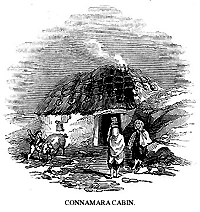 Those peasant
girls, and the Connemara cabin are features in the same picture of Irish
poverty. The latter is on the same scale of comfort as the hut of the Esquimaux,
or the wigwam of the North American Indian. To have a regularly-built chimney
instead of a hole in the roof, would be to let all the smoke out, which is not
the object of the inmates; or, in other words, it would not suit their purpose.
They require a portion of it, at least to warm the cabin, to keep out the cold
air from the chinks in the mud walls, and to season their flitch of bacon. In
that familiar-looking porker, which seems "hail fellow, well met!"
with the little boy who is driving him in out of the cold, behold the "spem
gregis," the real hope of the family: the bonneen (pig) is the Irish
peasant's mainstay. He goes far, if not the whole way, to pay the rent. When we
mentioned a flitch of bacon, let not the English reader imagine that the
miserable occupants of the cabin "live up" to such luxury. The most
they do is to hang it in the chimney, and let it drip on their potatoes, each
poor creature in turn pointing a potato to receive the dropping grease. This
meal is called "potatoes and point." Poor Power! how admirably
he used to give that droll scene in "The White Horse of the Peppers,"
where Gerald Pepper describes this charte à manger to the Dutchman, who
wondered how a whole family could feed for so long a time on a small herring.
"You may rub your pratye on the skin of the fish," said he, "if
you wish to make a baste of yourself!"
Those peasant
girls, and the Connemara cabin are features in the same picture of Irish
poverty. The latter is on the same scale of comfort as the hut of the Esquimaux,
or the wigwam of the North American Indian. To have a regularly-built chimney
instead of a hole in the roof, would be to let all the smoke out, which is not
the object of the inmates; or, in other words, it would not suit their purpose.
They require a portion of it, at least to warm the cabin, to keep out the cold
air from the chinks in the mud walls, and to season their flitch of bacon. In
that familiar-looking porker, which seems "hail fellow, well met!"
with the little boy who is driving him in out of the cold, behold the "spem
gregis," the real hope of the family: the bonneen (pig) is the Irish
peasant's mainstay. He goes far, if not the whole way, to pay the rent. When we
mentioned a flitch of bacon, let not the English reader imagine that the
miserable occupants of the cabin "live up" to such luxury. The most
they do is to hang it in the chimney, and let it drip on their potatoes, each
poor creature in turn pointing a potato to receive the dropping grease. This
meal is called "potatoes and point." Poor Power! how admirably
he used to give that droll scene in "The White Horse of the Peppers,"
where Gerald Pepper describes this charte à manger to the Dutchman, who
wondered how a whole family could feed for so long a time on a small herring.
"You may rub your pratye on the skin of the fish," said he, "if
you wish to make a baste of yourself!"
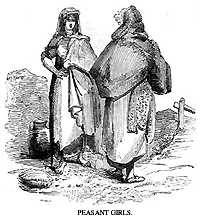 The blue-eyed,
fair-haired, laughing girls, whom you perceive, one a drawer of water like
Rebecca, and the other returning home from market like any female character that
suits your recollections, from the works of any of the great masters, except
those of the Flemish school-- for Sheela Maguire is spiritually
contradistinguished to gross nature-- are both of them "parties" (as
the attorneys say) of no mean consequence in their own and in their sweethearts'
estimation. Fine fellows these sweethearts are too, and their intentions are
honourable and pure, as ever were offered up at the shrine of beauty. Nora may
return home across the fields from the fountain, Sheela along the road with the
produce of her eggs and butter, at any hour of the night they like. The one need
not be afraid of having her pitcher broken, or the other of having her basket
crushed by anything like an attempt at felonious gallantry.
The blue-eyed,
fair-haired, laughing girls, whom you perceive, one a drawer of water like
Rebecca, and the other returning home from market like any female character that
suits your recollections, from the works of any of the great masters, except
those of the Flemish school-- for Sheela Maguire is spiritually
contradistinguished to gross nature-- are both of them "parties" (as
the attorneys say) of no mean consequence in their own and in their sweethearts'
estimation. Fine fellows these sweethearts are too, and their intentions are
honourable and pure, as ever were offered up at the shrine of beauty. Nora may
return home across the fields from the fountain, Sheela along the road with the
produce of her eggs and butter, at any hour of the night they like. The one need
not be afraid of having her pitcher broken, or the other of having her basket
crushed by anything like an attempt at felonious gallantry.
"Lady, dost thou not fear to strayThe contrary has turned out, of course, now and then of--
So late and so lone by the bleak way?
Are Erin's sons so dead or so cold,
As not to be tempted by woman or gold?
Sir Knight, I feel not the least alarm,
No son of Erin shall offer me harm;
For tho' they love woman and golden store,
Sir Knight, they love honour and virtue more."
"Blessed for ever was she who relied
On Erin's honour and Erin's pride."
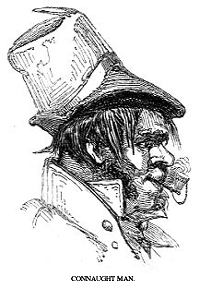 That Connaught
man, with the bonnet-like caubeen, the short pipe, curly whiskers, and
over-hanging brow, is a dangerous-looking Lothario to trust in your meadows or
corn-fields after dark, and looks very like a gay deceiver.
That Connaught
man, with the bonnet-like caubeen, the short pipe, curly whiskers, and
over-hanging brow, is a dangerous-looking Lothario to trust in your meadows or
corn-fields after dark, and looks very like a gay deceiver.
The cottage, in the doorway of which an old woman is spinning, and around which are pigs, poultry, and goats, or cabin it still must be called, when we recollect the general cleanliness and comfort of the cottage homes of England, may supposed to be in one of the best districts of Leinster, the metropolitan province of Ireland. It is of the same structure and economy now as the cabins were upwards of thirty years ago when Mr. Wakefield visited Ireland. In his work, one of the most comprehensive and impartial ever written on the state of the sister country, he describes the roofs of the cabins in Westmeath without ceiling, supported by two or three props. "The walls," he adds, "were constructed of mud or stones, and sometimes of a mixture of both. The roof is formed by two or three couples, over which are laid, in a cross direction, the boughs of trees not stripped of their leaves. These are covered with turf, which is protected by the effects of the weather by a thatching of straw. A hole in the roof gives venting to the smoke, and the bare ground is the floor and the hearth. A hay-band so neatly twisted as to be almost equal to a tow-rope, is stretched across the cabin, nearly over the fire-place, for hanging the linen to dry; but as the place is generally involved in thick smoke, it may be readily conceived that it will acquire little improvement in colour. A cat and two or three dogs are commonly lying round the fire. An iron pot, two or three stools of the rudest workmanship, a bad deal table, a dresser with a few plates and dairy vessels, are all the utensils and furniture of the family."
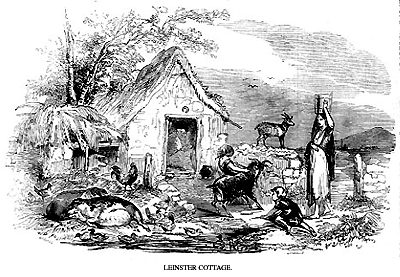
Thompson, in his "Survey of Meath," remarks that the clay for the walls and roof is taken from the spot on which the cottage is raised, leaving the surface of the floor and the ground immediately about the walls the lowest part, and of course subject to receive all the surrounding damp; "so much so," he says, "that I have often gone into a cabin and seen a hole dug in the floor to receive the water coming in at the door or under the foundation, from whence it might be baled with greater ease when collected. On this damp floor the family most commonly sleep, generally without a bedstead, none of them having a loft except in town cabins, where the ground for building on is more valuable."
The goat is found to be of profit to the poor cabin-keeper in some districts of Ireland, especially in the north. Sir Charles Coote, in his "Survey of Armagh," states that the milk of the goat, whose food is never taken into account, is equal to one-fourth of a cow's, and that it is richer and exceedingly wholesome. Mr. Tighe, in his "Survey of Kilkenny," states that these animals are kept by many small farmers, but not in flocks, and that a few were to be found among the dairies in the Welsh mountains (a district in that county); and he adds that "the milk of six goats is said to be equal in quantity to that of one cow." Mr. Sampson, in his "Survey of Derry," ways with respect to that county, that "there are no herds of goats in the mountains, but they are found individually among the habitations of the lowland poor. You frequently see the milch-goat tied by the head while she browses on the quickset of a neighbour; her owner has no hedge-- no land! He has a friend, however, for his little ones when he has the shegoat. The milk is divided for five weeks with the kid; the kid is sold as venison, and the goat remains the best succour under Heaven. Where there are many the custom is to fold them at night and keep off the kids, then milk them in the morning, and admit the natural client for the rest of the day. In high pastures much must be made of their milk, and their browsing costs nothing."
The cottage of the better class of Irish peasants is to be seen here and there through the provinces of Munster and Leinster; very rarely, indeed, in Connaught, but chiefly in the north of Ireland. Do not let us be carried away by the usually accepted notion that the more comfortable appearance of the peasantry in the northern province is owing to difference of religion, it being called Protestant Ulster. The reason is, simply, because they have better landlords. The Irish society, for instance (certain guilds of the London corporation), to whom James I. gave the territories of the O'Neals, O'Donnells, and other attained northern chieftains for the propagation of protestantism, have ever been justly considered the best landlords of Ireland. Independently of this consideration, the greater part of the lower orders certainly are of the old faith of their country. Fifty years ago there was not a Catholic inhabitant within the walls of Londonderry, called the maiden city, from the gallant and triumphant defence which Governor Walker and the "'Prentice Boys" made against James II.'s besieging force. The majority of the inhabitants are now Roman Catholics, including, all those who live in the streets built beyond the walls and ramparts in later years. The small farmer or better class Irish peasant in the better districts-- such as the north, to which we have thus made especial allusion, or elsewhere, in Meath, Westmeath, Kildare, Kilkenny, some parts of Limerick, Cork, &c.-- is a shrewd, hard-working, sober, honest being; high spirited, hospitable, and happily and peaceably inclined, so long as he considers himself treated. If you treat him with particular kindness you may command his life. From the class of small farmers not a few of the Catholic clergy of Ireland have sprung; and their constant and kind intercourse with it, independently of the old feeling of veneration which attaches to them, is the main reason of their popularity and the main spring of their power. O! ye wretched absentees-- you clearers of the soil by whole families and tribes-- ye moral exterminators-- for the time is come for all parties in England to call you by your proper name-- if you knew the affections you trample on and destroy, the rich worth you throw away to add a hundred or two to your incomes; or to purchase an artificial importance, you would alter your plan, and try the soothing system. You-- and remember that property has its duties as well as its rights-- you are now finding out that it has its real interests also. You would imitate the "live and let live" system which is acted up to between the English landlord and tenant. You would go amongst those by the sweat of whose brow you live. You would administer to their wants, and contribute to their happiness. You would learn the pleasure of doing good. You may even learn a wholesome moral lesson by going amongst the poor sometimes; they have rugged virtues which you might imitate sometimes with advantage. In their simple and touching stories your hearts may be softened, and your better nature drawn out:--
"Let not ambition mock their useful toil,
Their homely joys, and destiny obscure;
Nor grandeur hear with a disdainful smile
The short and simple annals of the poor."
GROUP OF CHILDREN.
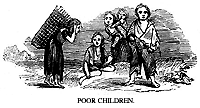 The group of
children claims particular attention. The description we have given of Padyheen,
the beggarwoman's son, may do for the boys, and yet we cannot chuse but look for
an instant at the chief figure in the foreground. Nothing can be more spirited--
"rollicking" the Irish call it-- more free from embarrassment, or more
graceful. He stands and looks every inch of him a little man. His shirt, which
in its best days was of a rough description, has grown rather fine-drawn by the
wear and tear of experience. Its collar is flung dashingly open, as if to say,
"there's a neck for you, my darlings." No white cravat, prim and
starched, á la jeune Angletere, stiffens that neck; no tie á la
Byron-- the disgusting appendage, in general, of our English hobbledehoys--
trains it prematurely to effeminate tenderness. His nether habiliment, like
those of Rip Van Winkle's boy is, in all probability, cut out of a pair of his
father's cast-off galligaskins. Full of holes are the young rapparee's
indispensables, not for any purpose whatever, not even for ventilation, as
some town bloods bore the roofs of their night hats to let out the ascending
fumes of their wine*; and rent to the very verge of decorum; "torn and
flying," like "Freedom's banner," described by Byron; but the
young patriot does not "nail his colours to the mast," as Scott
describes Pitt to have done; for he has lost his gallowses
in his last scrimmage by the river's marge, or the edge of a bog-hole;
and his right hand is obliged to pay obeisance to the conventionalities of
society. The wit of the Irish peasant urchin is proverbial, and his talent for
waggery and mischief is one of the "gamin de Paris" kind, and something
more. He is of merry blood, and was born a farceur. "I'll be up
to that thief of a magpie," said a young rogue of this description, on
finding out that the "gazza ladra" of his father's garden had taken
away some of his marbles and certain of his little sister's playthings. He
watched his opportunity, and when the bird next left her nest on which she had
been hatching, he climbed up the tree and took her eggs away. These he very
quickly boiled, and climbing up again, replaced them in the nest. As magpies,
although clever birds in their way, and up to a thing or two, do not carry
three-minute time glasses about them, nor patronize egg saucepans, the one in
question was totally unconscious, on her return, of the fatal blow which had
been given to her philogenitive expectations. "They'll be fine birds when
they're hatched," the little chuckler used to say, for many a day, as he
watched the poor unconscious bird patiently endeavouring to bring about which
was not to be. There is an anecdote told somewhere of Voltaire that, when very
young, he wrote the following epigram on a statue of Idleness, a little boy with
a piece of bread to his mouth, which stood in the school-room:--
The group of
children claims particular attention. The description we have given of Padyheen,
the beggarwoman's son, may do for the boys, and yet we cannot chuse but look for
an instant at the chief figure in the foreground. Nothing can be more spirited--
"rollicking" the Irish call it-- more free from embarrassment, or more
graceful. He stands and looks every inch of him a little man. His shirt, which
in its best days was of a rough description, has grown rather fine-drawn by the
wear and tear of experience. Its collar is flung dashingly open, as if to say,
"there's a neck for you, my darlings." No white cravat, prim and
starched, á la jeune Angletere, stiffens that neck; no tie á la
Byron-- the disgusting appendage, in general, of our English hobbledehoys--
trains it prematurely to effeminate tenderness. His nether habiliment, like
those of Rip Van Winkle's boy is, in all probability, cut out of a pair of his
father's cast-off galligaskins. Full of holes are the young rapparee's
indispensables, not for any purpose whatever, not even for ventilation, as
some town bloods bore the roofs of their night hats to let out the ascending
fumes of their wine*; and rent to the very verge of decorum; "torn and
flying," like "Freedom's banner," described by Byron; but the
young patriot does not "nail his colours to the mast," as Scott
describes Pitt to have done; for he has lost his gallowses
in his last scrimmage by the river's marge, or the edge of a bog-hole;
and his right hand is obliged to pay obeisance to the conventionalities of
society. The wit of the Irish peasant urchin is proverbial, and his talent for
waggery and mischief is one of the "gamin de Paris" kind, and something
more. He is of merry blood, and was born a farceur. "I'll be up
to that thief of a magpie," said a young rogue of this description, on
finding out that the "gazza ladra" of his father's garden had taken
away some of his marbles and certain of his little sister's playthings. He
watched his opportunity, and when the bird next left her nest on which she had
been hatching, he climbed up the tree and took her eggs away. These he very
quickly boiled, and climbing up again, replaced them in the nest. As magpies,
although clever birds in their way, and up to a thing or two, do not carry
three-minute time glasses about them, nor patronize egg saucepans, the one in
question was totally unconscious, on her return, of the fatal blow which had
been given to her philogenitive expectations. "They'll be fine birds when
they're hatched," the little chuckler used to say, for many a day, as he
watched the poor unconscious bird patiently endeavouring to bring about which
was not to be. There is an anecdote told somewhere of Voltaire that, when very
young, he wrote the following epigram on a statue of Idleness, a little boy with
a piece of bread to his mouth, which stood in the school-room:--
"Tu qui semper edisWhich we translate:
Dic mihi quando bibes?"
Thou that art always eating, tellPadyheen eats and drinks whenever he can, and as well as a hand-to-mouth existence will let him; but if you ask him when he works or goes to school, his answer is "when he can't help it." That is not his fault, however. Change the system you have long observed towards him, and his country and his condition will be changed. If he appears the portrait of idleness at ease, his sister, poor child, with the basket of turf on her back, under which she bends, is the reverse of the picture. She does not get much hard work, however, although she does something to earn her potatoes. Her mother works hard at field work, but she has a greater tenderness for her child than the parents of our manufacturing and mining districts. Little Kathleen is innocent wildness itself-- not innocence run wild. Unwashed as she may be, you may venture to put her sitting in the wash-tub with much more triumphant effect than attended the experiment tried upon Æsop's blackamoor. She may not walk out a little Venus from the soap-suds all whiteness, like Aphrodite herself, rising up from her parent foam of the ocean, for heaven's canopy in all weathers being her covering by day, and by now and then by night too, "for the want of a better;" she will turn out at best, either now or hereafter, but a simple blue-eyed nut-brown maid. Unlike brunettes of cold climates, however, she is literally thin-skinned in her physical as well as her moral nature. The reason why she lives almost exclusively on vegetable diet, and as she will tell you herself, "Not a mighty deal of that same." Nothing gross is there in her habits of body to generate a coarsely cutaneous exterior; no phlegmatic or dyspepsical visitings to stop the free current of blood and digestion. Take a hint from this all you that labour, and are in pain from the plethoric effects of your hypercarnivrous propensities; not you alone who try, not even to propitiate injured nature by healthful bodily exercise, lolling and lounging as you do your short hour of fresh air before dinner, in softly-downed soft-rolling carriages in the park; but all your children, young and old, and of both sexes of the hard-working middle classes, who eat mutton chops for breakfast, cold fowl for your luncheon, fish, flesh, and fowl for your dinner, a slice of ham or two with your tea, and meat again for your supper. This is the true statement of the case, worth all the magnostics of the faculty. Take a hint from little Kathleen.
When you'll have something to drink as well?
IDIOT BOY
 The wretched mendicant,
with her idiot boy, is an object of deep commiseration. Mother and son are
looked upon with extreme kindness by the neighbours; and the poor youth to whom
this world is a blank is deemed the heir of blessedness in the world to come,
which causes a sort of religious feeling to be observed towards him. The poorest
wretch to whom his mother appeals in his behalf would be almost afraid, in the
sight of Heaven, to refuse to divide a handful of meal or potatoes with him.
From morning till night his eternal "pal, la! pal la!" is
heard, unless when he stops the cravings of hunger with the offals that are
thrown to him by the hand of poverty-stricken charity. Our artist has drawn him
from the life, whether the phrenology or the physiognomy of the animal be taken
into consideration. The forehead goes suddenly and pointedly back, like that of
Thersites, so masterly described in the Iliad by the great father of poetry; and
in the blank stare of his vacant countenance may be seen the verification of the
distinction made by one of our philosophers between madness and idiocy-- namely,
that the former drew right conclusions from wrong premises, whilst the latter
drew from to premises-- that is, had no thought at all.
The wretched mendicant,
with her idiot boy, is an object of deep commiseration. Mother and son are
looked upon with extreme kindness by the neighbours; and the poor youth to whom
this world is a blank is deemed the heir of blessedness in the world to come,
which causes a sort of religious feeling to be observed towards him. The poorest
wretch to whom his mother appeals in his behalf would be almost afraid, in the
sight of Heaven, to refuse to divide a handful of meal or potatoes with him.
From morning till night his eternal "pal, la! pal la!" is
heard, unless when he stops the cravings of hunger with the offals that are
thrown to him by the hand of poverty-stricken charity. Our artist has drawn him
from the life, whether the phrenology or the physiognomy of the animal be taken
into consideration. The forehead goes suddenly and pointedly back, like that of
Thersites, so masterly described in the Iliad by the great father of poetry; and
in the blank stare of his vacant countenance may be seen the verification of the
distinction made by one of our philosophers between madness and idiocy-- namely,
that the former drew right conclusions from wrong premises, whilst the latter
drew from to premises-- that is, had no thought at all.
![]()